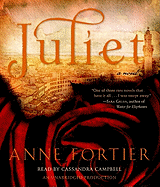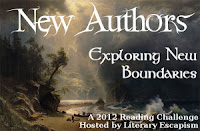My bookstore received a comp audio of Another Piece of My Heart, so I took a chance on it. I'd read Jemima J before, but that's about all I knew of Jane Green, other than a vague sense of being chick-lit. I have different criteria for audio books than for books I read, so I was happy to have this to listen on my commute, despite its not being a title I'd have chosen to read.
The author does her own reading, and at first I found her voice extremely grating. By the time I came to the end, it didn't bother me nearly as much, but I still wouldn't rate her as a particularly good reader. It was also mildly disconcerting listening to her American characters speak with her heavily British-inflected voice.
At first I thought the point of view was strictly third person, but then I got to disc #5 and BAM--it switched to first person. I'm not a fan of multiple narrators or POV switches, and it felt completely random, but eventually the book shifted regularly between third person and first person for most chapters in the second half. I think this is very lazy writing and it's rarely done well.
It's the store of a blended family: father, stepmom, two daughters, and an exwife. Except the older daughter is a nightmare and everybody knows it except her. The father, Ethan, is so namby-pamby and ineffectual that he might as well be a father from the fairy tales. The stepmother, Andi, isn't wicked at all. She's perfectly sane, if a bit quick to overreact. The exwife is in a drunken state for the first half of the book and hardly worth mentioning. The younger daughter is pliable and reasonable beyond her years.
Lots of family drama: teenage hissy fits, drunken pregnancies, abandoned babies. Emily, the older daughter and the first person narrator in the book, is the most self-absorbed teen I've ever met in fiction OR in real life, and that's saying something. Listening to her sections was excruciating. If I'd been reading them, the book would have been thrown across the room.
I am part of a blended family myself, though in my case it's the grandchildren who are the ages of the children in this book, and I get that it's hard on both sides. But this book was so full of angst and drama that it was hard to take seriously, or at least it would have been if I'd been reading it. Listening to it, though, somehow diminishes its flaws, and I'm not sure why that's the case.
The author does her own reading, and at first I found her voice extremely grating. By the time I came to the end, it didn't bother me nearly as much, but I still wouldn't rate her as a particularly good reader. It was also mildly disconcerting listening to her American characters speak with her heavily British-inflected voice.
At first I thought the point of view was strictly third person, but then I got to disc #5 and BAM--it switched to first person. I'm not a fan of multiple narrators or POV switches, and it felt completely random, but eventually the book shifted regularly between third person and first person for most chapters in the second half. I think this is very lazy writing and it's rarely done well.
It's the store of a blended family: father, stepmom, two daughters, and an exwife. Except the older daughter is a nightmare and everybody knows it except her. The father, Ethan, is so namby-pamby and ineffectual that he might as well be a father from the fairy tales. The stepmother, Andi, isn't wicked at all. She's perfectly sane, if a bit quick to overreact. The exwife is in a drunken state for the first half of the book and hardly worth mentioning. The younger daughter is pliable and reasonable beyond her years.
Lots of family drama: teenage hissy fits, drunken pregnancies, abandoned babies. Emily, the older daughter and the first person narrator in the book, is the most self-absorbed teen I've ever met in fiction OR in real life, and that's saying something. Listening to her sections was excruciating. If I'd been reading them, the book would have been thrown across the room.
I am part of a blended family myself, though in my case it's the grandchildren who are the ages of the children in this book, and I get that it's hard on both sides. But this book was so full of angst and drama that it was hard to take seriously, or at least it would have been if I'd been reading it. Listening to it, though, somehow diminishes its flaws, and I'm not sure why that's the case.






















